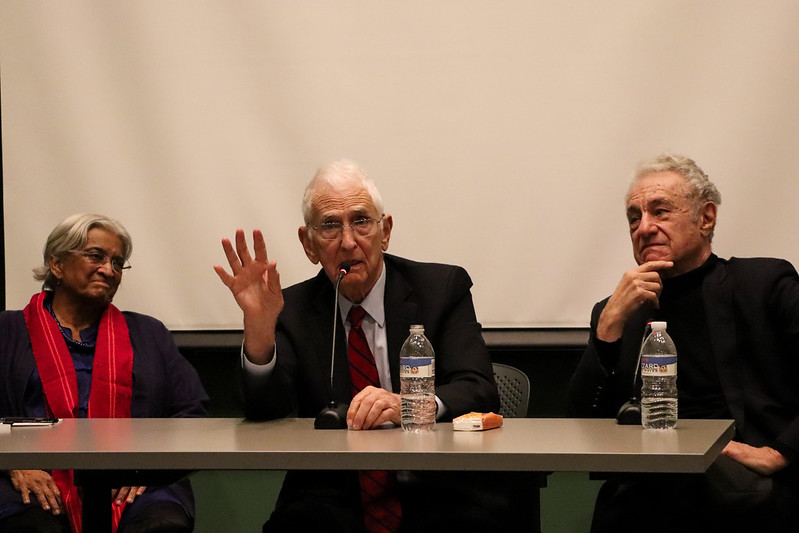Prominent U.S. “whistleblower” and activist Daniel Ellsberg spoke at his second event at the University of Massachusetts in Gordon Hall during a discussion on behavioral economics and social theory.
Ellsberg is a new distinguished fellow of the Political Economy Research Institute at UMass, and is well known for releasing the Pentagon Papers to several news outlets in 1971 while working as high-level Vietnam war planner. The papers outlined U.S. involvement in the Vietnam War and revealed the federal government had been misleading the public. UMass announced they had acquired Ellsberg’s personal papers in September.
The event, titled “The Dollar Auction, Unendable Wars and Gambling with Catastrophe, discussed how states make decisions and related it to U.S. involvement in Vietnam.
Ellsberg began his lecture by auctioning off a dollar and explaining that when the exercise is done, people are willing to pay values exceeding one dollar. He explained the reason for this phenomenon is the mentality that one shouldn’t be a quitter and will keep agreeing to pay more if that means they win, even if there is no monetary gain.
The dollar auction analogy was related to the idea of being a loser or quitter in society, and how catastrophic events like Chernobyl, the Challenger Explosion, Vietnam, 9/11 and others are a result of officials valuing being a winner over morality. Ellsberg explains how not being a quitter in the dollar auction doesn’t hurt anyone, but in real world examples like Vietnam, not being a quitter means bombing innocent citizens in an “unendable” war.
“No one believed the bombing we were doing was worth doing,” Ellsberg said. “Every species on earth depends on changing that behavior.”
Ellsberg further engaged his audience by relating his theories with current events, such as Boeing CEO Dennis Muilenburg’s comments on how he was aware of safety issues regarding the 737 Max jet crash.
Several students who attended the event reflected positively on the event and Ellsberg’s perspective.
“I thought it was so interesting that Washington lied to the U.S. at the time we were in Vietnam and that Ellsberg saw through everything and had the ability and mindset to step forward and fix it,” freshman Isenberg School of Management student Hannah Melendy said. “He was prepared to face the consequences of his decision because, as an American citizen, he could no longer comply with concealing this information from the people.”
Freshman sociology major Andrew Dunhom said, “loved the way [Ellsberg] justified his decision to release the papers with his background in rational decision making.
“His lecture was great because of his example of the dollar auction, which he compared to the Vietnam War one-sided arms race.”
“I think it was awesome that I and other UMass students could learn from Ellsberg, someone with real experience in the government, that has seen the consequences of what he called ‘irrational decision making,’” Dunhom added.
On Monday, Ellsberg spoke on a panel discussion following the screening of the film “The Most Dangerous Man in America: Daniel Ellsberg and the Pentagon Papers.” Ellsberg will also be speaking on Wednesday at the 21st Annual Friends of the Libraries Fall Reception.
Leigh Appelstein is a Collegian correspondent and can be reached at [email protected] and followed on Twitter @Lappelstein.




















